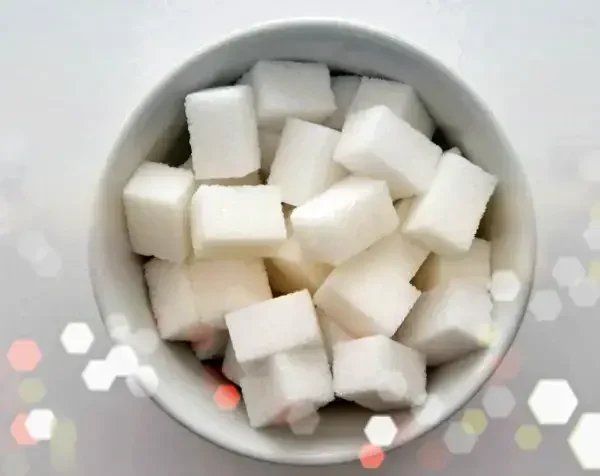Sweetness. It’s the comforting treat at the end of a long day, the celebratory centerpiece of our happiest moments, and the quick energy boost we crave mid-afternoon.
Sugar, in its many delightful forms candies, sodas, cakes, and even seemingly innocent yogurts has woven itself into the fabric of our daily lives.
For most of us, sweets are a cherished indulgence, a simple pleasure. But what if this simple pleasure is silently waging a war on your health?
Sweetness this is Sugar.
Scientists and nutritionists have long moved past viewing sugar as just a source of “empty calories.” The evidence is now overwhelming: excessive sugar consumption is a primary driver behind some of the most pressing health crises of our time.
It’s not merely about gaining a few extra pounds; it’s about transforming your body’s internal environment into a battleground for chronic disease. To truly protect your well-being, it’s crucial to understand what happens inside your body when sweetness becomes excess.
The Daily Sugar Allowance.
A Line We Too Often Cross.
Before diving into the dangers, let’s define what “too much” actually means. Health organizations worldwide have set clear guidelines. The American Heart Association (AHA), a leading authority on cardiovascular health, recommends a strict limit on added sugars.
For women, the daily maximum is 25 grams (about 6 teaspoons), and for men, it’s 36 grams (about 9 teaspoons). This should constitute no more than 10% of your total daily caloric intake.
The problem?
It is astonishingly easy to exceed this limit. A single 12-ounce (355 ml) can of soda can contain over 39 grams of sugar, blowing past the entire daily recommendation in one go.
The bigger issue is that sugar offers no sense of satiety. Unlike fiber-rich foods like broccoli or protein-packed chicken breast that signal fullness to your brain, sugar is metabolically unsatisfying.
It’s easy to consume hundreds of sugary calories and still feel hungry, leading your brain to crave even more. This creates a dangerous feedback loop that is difficult to break.
The Alarming Consequences of Excess Sugar.
When you consistently consume more sugar than your body can handle, it triggers a cascade of negative effects. Here are eight of the most significant dangers:
1. The Blood Sugar Rollercoaster and the Path to Diabetes When you eat sugar, it is rapidly absorbed into your bloodstream, causing a sharp spike in blood glucose. Your pancreas responds by releasing a flood of insulin, a hormone tasked with moving that glucose into your cells for energy.
This sudden surge often overcompensates, causing your blood sugar to crash, leaving you feeling tired, irritable, and hungry again a classic “sugar crash.” Over time, this constant up-and-down exhausts your pancreas. Your cells can become resistant to insulin’s signals, forcing the pancreas to work even harder.
This condition, known as insulin resistance, is the direct precursor to Type 2 Diabetes, a chronic illness that can lead to severe complications, including nerve damage, kidney failure, and vision loss.
Your blood vessels.
2. A Silent Surge in Blood Pressure The link between sugar and heart disease is often overshadowed by concerns about fat and cholesterol, but it is just as menacing. High sugar intake contributes directly to hypertension (high blood pressure).
It does this in two ways: first, it can decrease the elasticity of your blood vessels, making them more rigid and less able to accommodate blood flow. Second, it causes your body to retain more sodium and water.
This increased fluid volume in your bloodstream puts extra strain on your heart and blood vessel walls. Chronic high blood pressure is a leading risk factor for heart attacks, strokes, and kidney disease.
3. The Unsettling Link to Mental Health Disorders Your brain relies on a steady supply of glucose to function optimally, but the sharp peaks and troughs caused by a high sugar diet create metabolic chaos.
The resulting fatigue, irritability, and lack of energy can significantly impact your mood. More alarmingly, a growing body of research has uncovered a strong correlation between high sugar consumption and an increased risk of depression.
Chronic inflammation, which is fueled by sugar, is believed to disrupt brain chemistry and impair the function of mood-regulating neurotransmitters like serotonin.
4. The Vicious Cycle of Obesity and Cravings Sugary drinks and desserts are packed with “empty calories” they provide a lot of energy but virtually no essential nutrients like vitamins, minerals, or fiber.
Because they don’t make you feel full, your brain’s reward system is activated without the corresponding feeling of satiety. This system, driven by the neurotransmitter dopamine, demands another “hit” of that pleasurable sweetness.
The result is a self-perpetuating cycle: you eat more sugar, you gain weight, and the hormonal and neurological changes from that weight gain make you crave sugar even more.
This isn’t a matter of willpower; it’s a powerful biological loop that leads directly to obesity.
The sugar diet.
5. Fueling Cardiovascular Disease Beyond its effect on blood pressure, sugar directly damages the cardiovascular system. Excess sugar in the blood can harm the delicate endothelial lining of your arteries, creating tiny abrasions.
The body treats this as an injury and initiates an inflammatory response, which can lead to the buildup of cholesterol-laden plaque (atherosclerosis). These plaques harden and narrow the arteries, restricting blood flow. If a plaque ruptures, it can form a clot that completely blocks an artery, causing a heart attack or stroke.
6. The Threat of Non-Alcoholic Fatty Liver Disease (NAFLD) Your liver plays a central role in metabolizing sugar, particularly fructose (a component of table sugar and high-fructose corn syrup). While your body’s cells can use glucose, only the liver can process fructose in significant amounts.
When the liver is overwhelmed with fructose, it converts the excess into fat. This fat accumulates in liver cells, leading to a condition called Non-Alcoholic Fatty Liver Disease (NAFLD).
In its early stages, NAFLD is often silent, but it can progress to inflammation (steatohepatitis), fibrosis, and eventually cirrhosis—severe, irreversible scarring of the liver that can lead to liver failure.
7. Wreaking Havoc on Hormonal Balance Sugar’s disruptive influence extends deep into the endocrine system. In women, high sugar intake and the resulting insulin resistance are known to exacerbate Polycystic Ovary Syndrome (PCOS), a hormonal disorder that can cause irregular menstrual cycles, acne, weight gain, and fertility problems.
In men, diets high in sugar have been linked to lower testosterone levels, which can lead to fatigue, decreased muscle mass, and a lower libido.
8. An Increased Risk of Cancer While sugar itself may not directly cause cancer, it creates an environment in the body where cancer cells can thrive.
Research has shown a correlation between diets high in sugary drinks and desserts and an increased risk of certain cancers, particularly breast cancer.
The mechanisms are believed to be related to the metabolic shifts caused by sugar, including chronic inflammation, obesity, and elevated insulin levels, all of which can fuel the rapid division and growth of malignant cells.
How to Reclaim Your Health and Reduce Sugar’s Harm.
Reading this list can be daunting, but the goal isn’t to create fear it’s to empower you with knowledge.
The good news is that you have the power to change your relationship with sugar. A complete ban is rarely effective; the “all-or-nothing” approach often leads to feelings of deprivation and eventual bingeing. Instead, focus on moderation and making smarter choices:
• Become a Label Detective: Start reading the nutrition labels on everything you buy. You will be shocked to find “hidden sugars” in savory foods like pasta sauce, bread, salad dressings, and ketchup.
• Hydrate Wisely: Eliminate sugary drinks. Sodas, sweetened teas, and fruit juices are some of the biggest culprits of added sugar. Replace them with water, sparkling water with a slice of lemon, or unsweetened herbal teas.
• Prioritize Whole Foods: Build your diet around foods that provide lasting energy and satiety. Focus on lean proteins, healthy fats, and high-fiber carbohydrates like vegetables, legumes, and whole grains. These foods stabilize your blood sugar and reduce cravings.
• Rethink Dessert: Find sweetness in natural sources. A bowl of fresh berries with plain Greek yogurt, a baked apple with cinnamon, or a piece of dark chocolate (70% cocoa or higher) can satisfy a sweet tooth without the sugar overload.
• Cook at Home: Restaurant and processed foods are often loaded with sugar for flavor. Cooking at home gives you complete control over the ingredients, allowing you to gradually reduce the amount of sugar you use.
Ultimately, managing your sugar intake is not about perfection; it’s about awareness and making conscious, incremental changes that will protect your body from the bitter consequences of a diet that is too sweet.
Have a Great Day!




